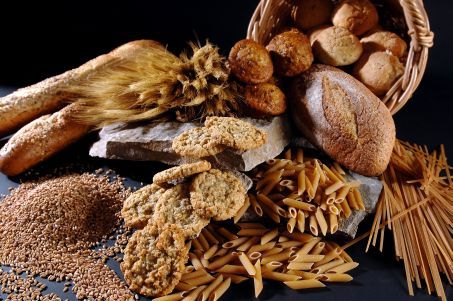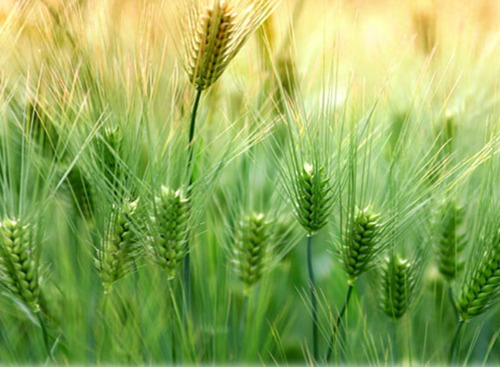You all know how much I love doing it, though. But no matter how often I sit down to dine on the stuff (and I’ve done it with great gusto in the past), I always leave the table feeling like I left something behind. Like maybe I wasn’t harsh enough about the danger of gluten, or I failed to really convey just how much I hated lectins. If I didn’t know better, I’d think the mere mention of grains was eliciting a crazy insulin-esque response and throwing my satiety hormones all out of whack. I was filling up on anti-grain talk, but I just couldn’t fill that void for long.
Well, I’ve got the hunger today, and this time I aim to stuff myself to the point of perpetual sickness. I don’t ever want to have to look at another anti-grain argument again (yeah, right). If things get a little disjointed, or if I descend into bullet points and sentence fragments, it’s only because the hunger has taken over and I’ve decided to dispense with the pleasantries in order to lay it all out at once.
So please, bear with me.
Apart from maintaining social conventions in certain situations and obtaining cheap sugar calories, there is absolutely no reason to eat grains. Believe me – I’ve searched far and wide and asked everyone I can for just one good reason to eat cereal grains, but no one can do it. They may have answers, but they just aren’t good enough. For fun, though, let’s see take a look at some of the assertions:
“You need the fiber!”
Okay, for one: no, I don’t. If you’re referring to its oft-touted ability to move things along in the inner sanctum, fiber has some unintended consequences. A few years back, scientists found that high-fiber foods “bang up against the cells lining the gastrointestinal tract, rupturing their outer covering” which “increases the level of lubricating mucus.” Err, that sounds positively awful. Banging and tearing? Rupturing? These are not the words I like to hear. But wait! The study’s authors say, “It’s a good thing.” Fantastic! So when all those sticks and twigs rub up against my fleshy interior and literally rupture my intestinal lining, I’ve got nothing to worry about. It’s all part of the plan, right?Somehow, I’m not convinced that a massive daily infusion of insoluble grain fiber is all that essential. And that “lubricating mucus” sounds an awful like the mucus people with irritable bowel syndrome complain about.
From personal experience I can tell you that once I completed my exodus from grains, the IBS completely stopped. If you’re not yet convinced on the fiber issue I’ll refer you to Konstantin Monastyrsky’s Fiber Menace. Anyway, there’s plenty of fiber in the vegetables and fruit I eat. Which takes me to the next claim:
“You need the vitamins and minerals!”
You got me. I do need vitamins and minerals, like B1 and B2, magnesium and iron, zinc and potassium. But do I need to obtain them by eating a carb-heavy, bulky grain? No, no I don’t. You show me a serving of “healthy whole grains” that can compete – nutrient, vitamin, and mineral-wise – with a Big Ass Salad. What’s that? Can’t do it? Thought so.“But it forms the foundation of the governmental food pyramid!”
You know, I should have just started the entire post with this one. I could have saved my fingers the trouble of typing and your eyes the trouble of reading. Governmental endorsements are not points in your favor, grain-eater; they are strikes against you. An appeal to authority (unless that “authority” is actually a preponderance of scientific evidence, of course) does not an effective argument make. Conventional Wisdom requires consistent, steady dissection and criticism if it is to be of any value.There’s a reason grains are first and foremost on the list of foods to avoid when following the Primal Blueprint: they are completely and utterly pointless in the context of a healthy diet. In fact, if your average unhealthy person were to ask for the top three things to avoid in order to get healthy, I would tell them to stop smoking, to stop drinking their calories (as soda or juice), and to stop eating grains. Period. Full stop.
They really are that bad.
I’ve mentioned this time and again, but the fundamental problem with grains is that they are a distinctly Neolithic food that the human animal has yet to adapt to consuming. In fact, cereal grains figured prominently in the commencement of the New Stone Age; grains were right there on the forefront of the agricultural revolution. Hell, they were the agricultural revolution – einkorn wheat, emmer, millet, and spelt formed the backbone of Neolithic farming. They could be stored for months at a time, they were easy enough to grow in massive enough quantities to support a burgeoning population, and they promoted the construction of permanent settlements. Oh, and they were easily hoarded, meaning they were probably an early form of currency (and, by extension, a potential source of income inequality). And here’s the kicker: they were harsh, tough things that probably didn’t even taste very good. It also took a ton of work just to make them edible, thanks to their toxic anti-nutrients.
Toxic anti-nutrients? Do tell.
Living things generally do not want to be consumed by other living things. Being digested, for the most part, tends to interrupt survival, procreation, propagation of the species – you know, standard stuff that fauna and flora consider pretty important. To avoid said consumption, living things employ various self defense mechanisms. Rabbits, for example, with their massive ears, considerable fast-twitch muscle fibers, and nasty claws, can usually hear a predator coming, outrun (out-hop?) nearly anything, and (in a pinch) slash a tender belly to shreds. Blue whales are too big to fit into your mouth, while porcupines are walking reverse pincushions. Point is, animals have active defense mechanisms. They run, fight, jump, climb, fly, sting, bite, and even appeal to our emotions (if you’ve ever seen a puppy beg for a treat with sad eyes, you know that isn’t just accidental cuteness) in order to survive. All the while, predators are constantly evolving and generating adaptations.Plants, though, are passive organisms without the ability to move, think, and react (for the most part). They must employ different tactics to ensure propagation, and they generally have to rely on outside forces to spread their seed. And so various methods are “devised” to dissuade consumption long enough for the seed to get to where it’s going. Nuts have those tough shells, and grains have the toxic anti-nutrients, lectins, gluten, and phytates. (Of course there are some obvious exceptions. Fruits are tasty, nutritious, and delicious so that animals will eat them whole and poop out the seeds, preferably into some fertile soil. The seed stays intact throughout the digestive process; it is indigestible by design. No seed “wants” to be digested, because this would defeat the purpose. They “want” to be swallowed, or borne by the wind, or carried by a bee to the next flower, but they do not want to be digested.)
Some animals are clearly adapted to grain consumption. Birds, rodents, and some insects can deal with the anti-nutrients. Humans, however, cannot. Perhaps if grains represented a significant portion of our ancestral dietary history, things might be a bit different. Some of us can digest dairy, and we’ve got the amylase enzyme present in our saliva to break down starches if need be, but we simply do not have the wiring necessary to mitigate the harmful effects of lectins, gluten, and phytate.
Lectins are bad. They bind to insulin receptors, attack the stomach lining of insects, bind to human intestinal lining, and they seemingly cause leptin resistance. And leptin resistance predicts a “worsening of the features of the metabolic syndrome independently of obesity”. Fun stuff, huh?
Gluten might be even worse. Gluten, found in wheat, rye, and barley, is a composite of the proteins gliadin and glutenin. Around 1% of the population are celiacs, people who are completely and utterly intolerant of any gluten. In celiacs, any gluten in the diet can be disastrous. We’re talking compromised calcium and vitamin D3 levels, hyperparathyroidism, bone defects. Really terrible stuff. And it gets worse: just because you’re not celiac doesn’t mean you aren’t susceptible to the ravages of gluten. As Stephan highlights, one study showed that 29% of asymptomatic (read: not celiac) people nonetheless tested positive for anti-gliadin IgA in their stool. Anti-gliadin IgA is an antibody produced by the gut, and it remains there until it’s dispatched to ward off gliadin – a primary component of gluten. Basically, the only reason anti-gliadin IgA ends up in your stool is because your body sensed an impending threat – gluten. If gluten poses no threat, the anti-gliadin IgA stays in your gut. And to think, most Americans eat this stuff on a daily basis.
Phytates are a problem, too, because they make minerals bio-unavailable (so much for all those healthy vitamins and minerals we need from whole grains!), thus rendering null and void the last, remaining argument for cereal grain consumption.
What, then, is the point to all this grain madness? Is there a good reason for anyone (with access to meat, fruit, and vegetables, that is) to rely on cereal grains for a significant portion of their caloric intake?
The answer is unequivocally, undeniably no. We do not need grains to survive, let alone thrive. In fact, they are naturally selected to ward off pests, whether they be insects or hominids. I suggest we take the hint and stop eating them.
And with that, I’m done. I don’t think I could eat another bite.
Source
http://www.marksdailyapple.com/why-grains-are-unhealthy/#axzz3dCGbmAfn






No comments:
Post a Comment